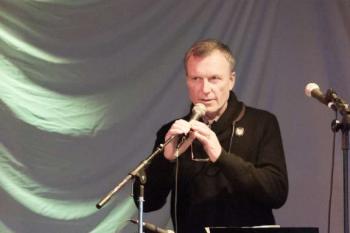Jay Speakman

The Working Waterfront Festival Community Documentation Project
This project documents the history and culture of the commercial fishing industry and other port trades. The project began in 2004 in conjunction with the Working Waterfront Festival, an annual, educational celebration of commercial fishing culture which takes place in New Bedford, MA. Interviewees have included a wide range of individuals connected to the commercial fishing industry and/or other aspects of the port through work or familial ties. While the majority of interviewees are from the port of New Bedford, the project has also documented numerous individuals from other ports around the country. Folklorist and Festival Director Laura Orleans and Community Scholar and Associate Director Kirsten Bendiksen are project leaders. The original recordings reside at the National Council for the Traditional Arts in Maryland with listening copies housed at the Festival's New Bedford office.
Jay Speakman is a former fisherman with a rich history in the fishing industry. Born in New Haven, Connecticut, Speakman considers Maine his true home, where he has roots going back several generations. His early experiences in fishing began as a child during summers spent on Little Cranberry Island, Maine, where he was introduced to lobster fishing. His career later took him to British Columbia and Alaska in the 1970s, where he engaged in various fishing activities including gill netting herring roe, long lining and seining for halibut, set netting for salmon and King Crabbing. Speakman's family history is deeply intertwined with the fishing industry, with ancestors who were fishermen from the Cranberry Isles. After leaving the fishing industry, Speakman transitioned into a career in retail, running a large store with his wife. Despite his departure from fishing, Speakman maintains a strong connection to the industry through his involvement in the Fisherpoets Gathering in Astoria, Oregon.
Scope and Content Note
This interview with Jay Speakman, conducted by Madeleine Hall Arber on September 27, 2013, provides a comprehensive exploration of Speakman's life and experiences in the fishing industry. Speakman discusses his early introduction to lobster fishing in Maine during his childhood summers, his later fishing experiences in British Columbia and Alaska, and the changes he has observed in the fisheries over the years. Speakman shares his perspective on the evolution of the fishing industry, including the economic challenges and regulatory changes that have impacted fishermen. He reflects on the shift from small-scale fishing to larger operations, the introduction of limited entry and individual quotas, and the effects of these changes on younger, more aggressive fishermen. Speakman also delves into his family history, revealing his lineage of fishermen from the Cranberry Isles. He reflects on his transition from fishing to running a retail store with his wife, and his ongoing connection to the fishing community through his involvement in the Fisherpoets Gathering in Astoria, Oregon. In addition, Speakman discusses his daughter's interest in fishing and her experiences in Alaska and Maine. He shares his belief in the importance of education and understanding the science behind fishing, emphasizing the responsibility fishermen have towards the creatures they harvest. The interview provides a rich narrative of Speakman's life, offering valuable insights into the social and cultural characteristics of fishing communities, changes in fishing technology, and the generational knowledge passed down within fishing families. It also highlights the ethical considerations involved in fishing, the importance of sustainable practices, and the role of education in fostering responsible fishing.
Please Note: The oral histories in this collection are protected by copyright and have been created for educational, research and personal use as described by the Fair Use Doctrine in the U.S. Copyright law. Please reach out Voices@noaa.gov to let us know how these interviews are being used in your research, project, exhibit, etc. The Voices staff can help provide other useful resources related to your inquiry.
The NOAA mission is to understand and predict changes in climate, weather, oceans, and coasts, to share that knowledge and information with others, and to conserve and manage coastal and marine ecosystems and resources. The Voices Oral History Archives offers public access to a wide range of accounts, including historical materials that are products of their particular times, and may contain offensive language or negative stereotypes.
Voices Oral History Archives does not verify the accuracy of materials submitted to us. The opinions expressed in the interviews are those of the interviewee only. The interviews here have been made available to the public only after the interviewer has confirmed that they have obtained consent.
